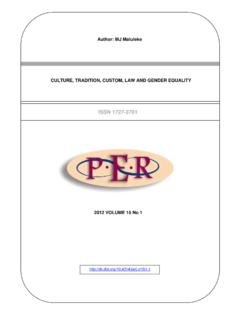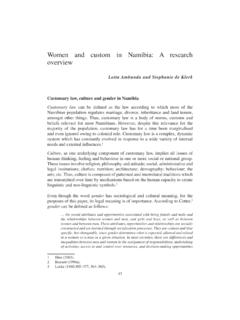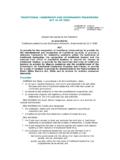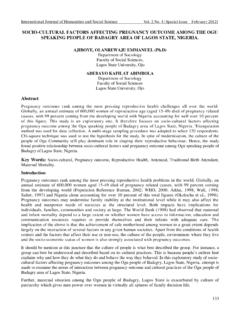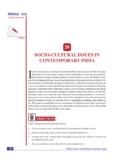Transcription of Lesotho Council of NGOs POLICY BRIEF
1 Lesotho Council of ngos POLICY BRIEF POLICY BRIEF No 2015/01 November 2015 Key Messages Lesotho Council of ngos Hoohlo Extension, House Bag A445, Maseru 100 Tel: (+266) 2231 7205/ 2232 5798 Fax: (+266) 2231 0412 Email: Council of Non-Governmental Organisation is an umbrella organizations for ngos in Lesotho . It was established in May 1990 with an objective of providing supportive services to the NGO Community. The Council implements this through networking and leadership training and development, information dissemination, capacity building, coordination, advocacy and representation when dealing with the government and the international community. The dual legal system application contradicts principle of human rights in the case where discrim-ination is allowed on the basis of culture and tradition.
2 What is evident is that without the quota, women s representation would have been lower than 30% as the number of women who en-tered councils through FPTP is lower. Even though there is high repre-sentation of women on local gov-ernment leadership, gender main-streaming, female empowerment is minimal in our communities Without the quota system of wom-en representation there is a need to capaci tate women on local governmentThe status of women in Lesotho with respect to participation in local governance is a signatory to numerous international conven-tions that prohibit all forms of discrimination, and interna-tional covenants that prescribe equal participation of men and women in civil and political rights.
3 The Lesotho s Constitution prohibits discrimination while at the same time allows discrimination on the basis of Customary Law. The application of the dual legal system in the coun-try presents a conun-drum for women s rights. However, the country has enact-ed a number of pro-gressive laws that are meant to address gender inequalities. The most silent ones are the Legal Capaci-ty of Married Persons Act of 2006 that put women at par with men and the Land Act of 2010 which empowers women to register land in their names. These laws are further strengthened by the Leso-tho Gender POLICY of 2003. The Decentralisation POLICY of 2014 has also been formulated to provide a framework for deepening and widening the economic and social bene-fits of democracy to all citizens.
4 The Local government structures have provided the government, development partners, NSAs and citizens a platform to promote grass-root democracy and an opportunity to identify local devel-The Local government structures have provided the government, de-velopment partners, NSAs and citi-zens a platform to promote grass-root democracy and an opportunity to identify local development needs. Despite this framework, the work of councils remains under-funded and structural-ly unsupported to function efficiently while wom-en s effective participation in local government processes remains a challenge. Despite several attempts by government to in-clude women in decision making positions such as using affirmative action through the use of quotas and PR system, women are still not ef-fectively participating in governance issues es-pecially at national level.
5 Moreover, women still experience a number of barriers that prohibit them to fully participate in governance process-es and these barriers are deeply rooted in the country s culture, tradition and social norms that negatively affect women. Men on the other hand have used the ecosystem to their advantage by continuously suppressing women in issues of leadership despite the gender frameworks in the country. Women in Lesotho especially rural wom-en make the majority in party politics but when it comes to participation in governance they are spectators who play the role of voting others into political is against this backdrop that Lesotho Council of ngos engaged Leratong Youth and Women De-velopment Centre to analyse the status of wom-en in Lesotho and to make recommendations on more effective strategies to address gender ine-qualities and enhance women s participation and engagement in governance issues both at local and national levels.
6 The purpose of the assign-ment was to analyse the status of rural women in Lesotho with regards to factors that limit their effective participation in local governance pro-cesses despite their high representation in local councils. This was done through a programme named: Building Capacity of Non-State Actors for Constructive Engagement in Local Government. Section 2 of the BRIEF will discuss the methods employed while section 3 will provide a summary of the findings from the study. Section 4 will con-clude the study and provide recommendations based on the evidence study employed both qualitative and quan-titative methodology. Secondary data was done through reviewing laws and policies while prima-ry data used Focus Group Discussions (FDGs) with groups of women men, and in-depth inter-views with key stakeholders ranging from part-ners, related ministries and donors.
7 When conducting the study, a participatory ap-proach adopted in order to facilitate a thorough understanding of factors that limit effective par-ticipation as well as those that function as incen-tives to women to take leadership roles. Qual-itative and quantitative information generated through desk/literature review was corroborat-ed through key informants consultation one to one interviews, Focus Group Discussions (FGD), questionnaires and narrative stories. In-terviews with representatives of institutions that were involved in gender equality issues and de-centralization were conducted. The study used purposive sampling in the LCN project area, whereby 8 community councils in 5 districts, were studied and 30 key stakehold-ers were also interviewed.
8 Those included gov-ernment departments, councils, ngos , donors, grassroots rural women s groups and local tradi-tional authorities. Data from these groups further clarified the extent to which the national gender POLICY frameworks and legislation have been implemented to address rural women s partici-pation in local governance. The analysis in turn informed identification of key challenges and necessary interventions. Summary of FindingsWhat is known on existing legislation, poli-cies and institutional arrangements that af-fect the status of women in Lesotho and the gaps that exist in legislation, policies and in-stitutional arrangements that affect the sta-tus of women in rural areas:There are laws and policies that have a gender provision; there are also laws that are gender neutral as well as laws that are discriminatory.
9 There is no synergy between the laws and their implementation laws and policies are there but there is no capacity building on the ground to ensure implementation. The study also identi-fied challenges in relation to changing mind sets about women leadership and value of quotas, in-adequate dissemination of dual legal system application contradicts principles of human rights in the case where dis-crimination is allowed on the basis of culture and and enforcement of laws is very weak, and ignorance of the laws by rural com-munities is high. This ignorance limits utilisation of these laws to empower communities and indi-vidual status of women s participation in gov-ernance at local and national level;The 49% women representation in Local gov-ernment is down from 58% in the 2005 elections where the country reserved 30% electoral divi-sions for women.
10 The initial reservation of elec-toral divisions in 2011 came as a result of some sections of society (men) who felt discriminated against in those electoral divisions they were prevented to contest elections. The current 49% women representation decline of about 9% can be partly attributed to the change in the appli-cation of the quota, while on the other hand we can assume that men began to be interested in these elections since they believed that this time around they were not being discriminated. What is evident though is that without the quota, women s representation would have been lower than 30% as the number of women who entered councils through the FPTP is impact of the high women s representa-tion in local government structures on re-dressing gender inequalities in rural areasWomen s high representation makes them visi-ble and more audible, (critical mass).


